Tilly Hill's World War I scrapbook
Transcription
Transcription history
-
Left page:
On left side is a newspaper article continued from the previous page:
all; redouble your energies, set your teeth
firm - and to Hell with the Hun.
"Be it written," said George Meredith,
"that all I wrought was for Britain - in
deed and thought; be it written that while
I die, 'Glory to Britain' is my dying cry."
George Meredith was a prophet. They were
Kitchener's last words, too - spoken to the
cruel waves.
* * * *
No, our Kitchener is not dead. We have
lent him to God. His majestic passing is a
call to Faith. Such a soul can never die.
For such men there is no death. He is the
Advance Herald of Britain's martyrs for the
Right. He has been called to join those of our
sons who have already "crossed over" to the
land of the Immortals - and from with those
who are to follow. Here, on earth, his
work was done. Yesterday, he was a name
to rally to; to-day he stands out in the
Heavens, a guiding star - a beacon blazing
on the hill tops, to cheer our troops and to
spur them on to victory. Our soldiers will
fight as they never fought before, knowing
that if they fall Kitchener is waiting to
welcome them to his side. They will swear to
his memory, and his example, to be worthy
of his Army - "Kitchener's Army" - until
the world shall ring for the triump of
Britain and her Allies.
* * * *
I can imagine no nobler inspiration,
too, for our gallant lads upon the sea - so
recently emerged, with undying honour,
from their fierce ordeal of fire. How
strangely wonderful, how deeply significant,
that Britain's greatest soldier should have
died a sailor's death - thus forging a fresh
bond between the sister services, uniting
Army and Navy more closely in one great
brotherhood of valour. It is related of the
old Norse Vikings, sires of our ocean race,
that with the conscious approach of death
they would put to sea, beating before the
wind; desiring no softer lullaby for that last
sleep than the music of the rushing waters.
In some such fashion passed the mighty soul
of Kitchener of Khartoum. Now let all the
bickering of the Politicians be hushed in the
presence of this great Manifestation; let them
be "drowned," too.
* * * *
It is a long time since I prayed. But let
us all do so to-day. Never mind the
Churches and the Chapels - their sects and
creeds - their Rubrics and their Rituals.
Come, every one of you - man, woman and
child - wherever, whoever, whatever you be;
and let us all unite in a simple, honest
prayer - straight from our hearts and souls -
in our own words, without dogma or form -
just an earnest, humble supplication to the
great God of the Universe - the God of
Love, the God of Mercy, the God of Justice
- to take under His especial care the
majestic soul of our lost hero - and grant
to it throughout eternity that peace which
passeth understanding. AMEN - AMEN -
AMEN. HORATIO BOTTOMLEY.
Bottom left corner newspaper article:
"Kerry Bred and Born"
One of Lord Kitchener's closest friends has
been telling me how very sensitive he is about
his nationality. Unemotional as he is in
most things, he was once stirred to almost
romantic anger. It was at Pall Mall club,
when some man not knowing Kitchener was
in the room turned to a friend and, referring
to something the great general had done,
said "By Jove, England ought to be proud
of that man - none of your Irishmen!" "On
the contrary, Kerry bred and born," was the
sharp and unexpected retort.
Upper right newspaper clipping of a photo of a house. The caption reads:
Exterior view of Gunsborough House, the Field-Marshal's birthplace.
Horatio Herbert, first Earl Kitchener of Khartum, first saw the light in Gunsborough
House, near Listowel, Co. Kerry, in June 1850.
Lower right article:
LORD KITCHENER.
--------
WRITING on the 63th anniversary of his birth, and in view
of so many varying statements in "Lives" and magazine
articles as to the actual birthplace of Lord Kitchener, it
may, perhaps, be of some interest to give a few lines of
explanatory facts from one who was born about the same time and
within three miles of his birthplace, and, as a small boy, frequently
met him and his brothers riding and walking about the neighbourhood.
Like his great prototype, the Duke of Wellington, Lord
Kitchener is an Irishman only by the accident of birth, his
ancestry being purely English, but the Irish people are none the
less proud of him, and so readily accord him at least brevet rank
as an Irishman.
Somewhere about the year 1847, his military duties found
"K of K's" father, Lieut.-Col. Kitchener, in Dublin, where
strolling one day into the sales room of the Irish Encumbered
Landed Estates Court, he found two estates in North Kerry being
offered for sale at such a low figure that he made a sporting bid
and much to his surprise found himself declared the purchaser.
After taking possession and having a look round he determined to
see the thing through, and soon took up residence in the neighbourhood;
but there not being a house on the properties suitable
for his wife and family, he rented "Gunsborough House," about
midway between the towns of Listowel and Ballylongford, where
his more famous son was born on the 24th June, 1850, and afterwards
baptised by the Rev. Robt. Sandes, B.A., at the little
parish church of Aghavallin, near Ballylongford, now in ruins, it
having been replaced some years ago by a more modern structure
erected on the other side of the road.
Col. Kitchener set to work with a will to improve the
previously neglected properties, building a bungalow residence on
his Ballygoughlan estate near the village of Tarbert, Co. Kerry,
where the family resided for some years until removing to "Crotha
House," near Trafee; in the meantime Col. Kitchener had
brought over two or three young Englishmen to reside with him
as agricultural pupils, and to whom he subsequently sold some
sections of his properties.
Later on, sometime in the mid sixties, he disposed of the
balance of his Irish estates to Mr. Beale Browne, a Gloucestershire
gentleman - father, the writer believes, of Col. Beale Browne,
of Dowdeswell - and Col. Kitchener and his family thereupon
returned to England.
By a curious coincidence, one of Lord Kitchener's colleagues
at the War Office, Major-General Kiggell, was born at "Cahara,"
Glin on the Western borders of the county Limerick, within about
three miles of Ballygoughlan, Lord Kitchener's early home.
Luke M. H.
Right Page:
Upper left newspaper article:
"NEWS - IMMEDIATE."
-----------
LORD KITCHENER'S
MOVEMENTS.
We have received from our correspondent
Glin, County Limerick, an item of news
which begins: "Field-Marshal Viscount
Kitchener, who has been motoring in his
native Kerry, has brought his tour to a
close, and before leaving the 'Kingdom
said a visit to Tarbert, which is about six
miles from Gunsboro', where his lordship was
born 60 years ago." The paragraph suggests
at first sight either that Lord Kitchener is
obiquitous or that our correspondent is in
error. The simple explanation, however, is
that this item was fresh and accurate when it
was posted at Glin on July 12th, 1910. It
was delivered at the Irish Times office on
March 9th, 1916. The Post Office informs us
that the letter slipped behind a partition in
the Sorting Office of the General Post Office,
Dublin, where it lay for six years,
and was only discovered during the
recent reconstructions in that department. It
may be added that our correspondent had
taken care to mark his envelope, "News -
Immediate."
There is a large newspaper clipping taking up most of the page of a woman seated in a dress with a small girl on the left and a young boy with a rifle on the right.
On top of the above photo are two other newspaper clippings.
The first is a picture of the interior of a room - we see a chair and curtain, etc, with the caption:
Corner of the room in which he first saw light.
Below that is a newspaper clipping of a photo of a baptism font and the caption:
Font in the church where the baptism
took place.
In the lower left of the page is a newspaper clipping:
Lord Kitchener -
Although born in Ireland, Lord
Kitchener was an East Anglian
by descent. At Lakesheath the
parish [ ] and the stones
of the Churchyard tell the
famil [ ] from the seventeenth
century. There are thirteen
graves of the Kitcheners
here, visited every year by numbers
of people. A tablet in the
tower tells that the [ ]
was hung during the time that
Thomas Kitchener was Church-warden.
The house in which
the family resided is still standing
and is known as "The
Rookery." W.H.P.
Lower middle newspaper clipping of a woman's face
Lady Maude, who is to receive a grant
of £25,000 in recognition of the services
of her husband, the late Sir
Stanley N [ ] in Mosopotamia.
Lower right newspaper article:
JUNE
5
THURSDAY
Lord Kitchener and his staff lost in
H.M.S. Hamphire, 1914.
There is an honour which may be asked
amongst the greatest . . . that is of such as
sacrifice themselves to death or danger for the
good of their country.
-
Left page:
On left side is a newspaper article continued from the previous page:
all; redouble your energies, set your teeth
firm - and to Hell with the Hun.
"Be it written," said George Meredith,
"that all I wrought was for Britain - in
deed and thought; be it written that while
I die, 'Glory to Britain' is my dying cry."
George Meredith was a prophet. They were
Kitchener's last words, too - spoken to the
cruel waves.
* * * *
No, our Kitchener is not dead. We have
lent him to God. His majestic passing is a
call to Faith. Such a soul can never die.
For such men there is no death. He is the
Advance Herald of Britain's martyrs for the
Right. He has been called to join those of our
sons who have already "crossed over" to the
land of the Immortals - and from with those
who are to follow. Here, on earth, his
work was done. Yesterday, he was a name
to rally to; to-day he stands out in the
Heavens, a guiding star - a beacon blazing
on the hill tops, to cheer our troops and to
spur them on to victory. Our soldiers will
fight as they never fought before, knowing
that if they fall Kitchener is waiting to
welcome them to his side. They will swear to
his memory, and his example, to be worthy
of his Army - "Kitchener's Army" - until
the world shall ring for the triump of
Britain and her Allies.
* * * *
I can imagine no nobler inspiration,
too, for our gallant lads upon the sea - so
recently emerged, with undying honour,
from their fierce ordeal of fire. How
strangely wonderful, how deeply significant,
that Britain's greatest soldier should have
died a sailor's death - thus forging a fresh
bond between the sister services, uniting
Army and Navy more closely in one great
brotherhood of valour. It is related of the
old Norse Vikings, sires of our ocean race,
that with the conscious approach of death
they would put to sea, beating before the
wind; desiring no softer lullaby for that last
sleep than the music of the rushing waters.
In some such fashion passed the mighty soul
of Kitchener of Khartoum. Now let all the
bickering of the Politicians be hushed in the
presence of this great Manifestation; let them
be "drowned," too.
* * * *
It is a long time since I prayed. But let
us all do so to-day. Never mind the
Churches and the Chapels - their sects and
creeds - their Rubrics and their Rituals.
Come, every one of you - man, woman and
child - wherever, whoever, whatever you be;
and let us all unite in a simple, honest
prayer - straight from our hearts and souls -
in our own words, without dogma or form -
just an earnest, humble supplication to the
great God of the Universe - the God of
Love, the God of Mercy, the God of Justice
- to take under His especial care the
majestic soul of our lost hero - and grant
to it throughout eternity that peace which
passeth understanding. AMEN - AMEN -
AMEN. HORATIO BOTTOMLEY.
Bottom left corner newspaper article:
"Kerry Bred and Born"
One of Lord Kitchener's closest friends has
been telling me how very sensitive he is about
his nationality. Unemotional as he is in
most things, he was once stirred to almost
romantic anger. It was at Pall Mall club,
when some man not knowing Kitchener was
in the room turned to a friend and, referring
to something the great general had done,
said "By Jove, England ought to be proud
of that man - none of your Irishmen!" "On
the contrary, Kerry bred and born," was the
sharp and unexpected retort.
Upper right newspaper clipping of a photo of a house. The caption reads:
Exterior view of Gunsborough House, the Field-Marshal's birthplace.
Horatio Herbert, first Earl Kitchener of Khartum, first saw the light in Gunsborough
House, near Listowel, Co. Kerry, in June 1850.
Lower right article:
LORD KITCHENER.
--------
WRITING on the 63th anniversary of his birth, and in view
of so many varying statements in "Lives" and magazine
articles as to the actual birthplace of Lord Kitchener, it
may, perhaps, be of some interest to give a few lines of
explanatory facts from one who was born about the same time and
within three miles of his birthplace, and, as a small boy, frequently
met him and his brothers riding and walking about the neighbourhood.
Like his great prototype, the Duke of Wellington, Lord
Kitchener is an Irishman only by the accident of birth, his
ancestry being purely English, but the Irish people are none the
less proud of him, and so readily accord him at least brevet rank
as an Irishman.
Somewhere about the year 1847, his military duties found
"K of K's" father, Lieut.-Col. Kitchener, in Dublin, where
strolling one day into the sales room of the Irish Encumbered
Landed Estates Court, he found two estates in North Kerry being
offered for sale at such a low figure that he made a sporting bid
and much to his surprise found himself declared the purchaser.
After taking possession and having a look round he determined to
see the thing through, and soon took up residence in the neighbourhood;
but there not being a house on the properties suitable
for his wife and family, he rented "Gunsborough House," about
midway between the towns of Listowel and Ballylongford, where
his more famous son was born on the 24th June, 1850, and afterwards
baptised by the Rev. Robt. Sandes, B.A., at the little
parish church of Aghavallin, near Ballylongford, now in ruins, it
having been replaced some years ago by a more modern structure
erected on the other side of the road.
Col. Kitchener set to work with a will to improve the
previously neglected properties, building a bungalow residence on
his Ballygoughlan estate near the village of Tarbert, Co. Kerry,
where the family resided for some years until removing to "Crotha
House," near Trafee; in the meantime Col. Kitchener had
brought over two or three young Englishmen to reside with him
as agricultural pupils, and to whom he subsequently sold some
sections of his properties.
Later on, sometime in the mid sixties, he disposed of the
balance of his Irish estates to Mr. Beale Browne, a Gloucestershire
gentleman - father, the writer believes, of Col. Beale Browne,
of Dowdeswell - and Col. Kitchener and his family thereupon
returned to England.
By a curious coincidence, one of Lord Kitchener's colleagues
at the War Office, Major-General Kiggell, was born at "Cahara,"
Glin on the Western borders of the county Limerick, within about
three miles of Ballygoughlan, Lord Kitchener's early home.
Luke M. H.
Right Page:
Upper left newspaper article:
"NEWS - IMMEDIATE."
-----------
LORD KITCHENER'S
MOVEMENTS.
We have received from our correspondent
Glin, County Limerick, an item of news
which begins: "Field-Marshal Viscount
Kitchener, who has been motoring in his
native Kerry, has brought his tour to a
close, and before leaving the 'Kingdom
said a visit to Tarbert, which is about six
miles from Gunsboro', where his lordship was
born 60 years ago." The paragraph suggests
at first sight either that Lord Kitchener is
obiquitous or that our correspondent is in
error. The simple explanation, however, is
that this item was fresh and accurate when it
was posted at Glin on July 12th, 1910. It
was delivered at the Irish Times office on
March 9th, 1916. The Post Office informs us
that the letter slipped behind a partition in
the Sorting Office of the General Post Office,
Dublin, where it lay for six years,
and was only discovered during the
recent reconstructions in that department. It
may be added that our correspondent had
taken care to mark his envelope, "News -
Immediate."
There is a large newspaper clipping taking up most of the page of a woman seated in a dress with a small girl on the left and a young boy with a rifle on the right.
On top of the above photo are two other newspaper clippings.
The first is a picture of the interior of a room - we see a chair and curtain, etc, with the caption:
Corner of the room in which he first saw light.
Below that is a newspaper clipping of a photo of a baptism font and the caption:
Font in the church where the baptism
took place.
In the lower left of the page is a newspaper clipping:
Lord Kitchener -
Although born in Ireland, Lord
Kitchener was an East Anglian
by descent. At Lakesheath the
parish [ ] and the stones
of the Churchyard tell the
famil [ ] from the seventeenth
century. There are thirteen
graves of the Kitcheners
here, visited every year by numbers
of people. A tablet in the
tower tells that the [ ]
was hung during the time that
Thomas Kitchener was Church-warden.
The house in which
the family resided is still standing
and is known as "The
Rookery." W.H.P.
Lower middle newspaper clipping of a woman's face
Lady Maude, who is to receive a grant
of 25,000 in recognition of the services
of her husband, the late Sir
Stanley N [ ] in Mosopotamia.
Lower right newspaper article:
JUNE
5
THURSDAY
Lord Kitchener and his staff lost in
H.M.S. Hamphire, 1914.
There is an honour which may be asked
amongst the greatest . . . that is of such as
sacrifice themselves to death or danger for the
good of their country.
-
Left page:
On left side is a newspaper article continued from the previous page:
all; redouble your energies, set your teeth
firm - and to Hell with the Hun.
"Be it written," said George Meredith,
"that all I wrought was for Britain - in
deed and thought; be it written that while
I die, 'Glory to Britain' is my dying cry."
George Meredith was a prophet. They were
Kitchener's last words, too - spoken to the
cruel waves.
* * * *
No, our Kitchener is not dead. We have
lent him to God. His majestic passing is a
call to Faith. Such a soul can never die.
For such men there is no death. He is the
Advance Herald of Britain's martyrs for the
Right. He has been called to join those of our
sons who have already "crossed over" to the
land of the Immortals - and from with those
who are to follow. Here, on earth, his
work was done. Yesterday, he was a name
to rally to; to-day he stands out in the
Heavens, a guiding star - a beacon blazing
on the hill tops, to cheer our troops and to
spur them on to victory. Our soldiers will
fight as they never fought before, knowing
that if they fall Kitchener is waiting to
welcome them to his side. They will swear to
his memory, and his example, to be worthy
of his Army - "Kitchener's Army" - until
the world shall ring for the triump of
Britain and her Allies.
* * * *
I can imagine no nobler inspiration,
too, for our gallant lads upon the sea - so
recently emerged, with undying honour,
from their fierce ordeal of fire. How
strangely wonderful, how deeply significant,
that Britain's greatest soldier should have
died a sailor's death - thus forging a fresh
bond between the sister services, uniting
Army and Navy more closely in one great
brotherhood of valour. It is related of the
old Norse Vikings, sires of our ocean race,
that with the conscious approach of death
they would put to sea, beating before the
wind; desiring no softer lullaby for that last
sleep than the music of the rushing waters.
In some such fashion passed the mighty soul
of Kitchener of Khartoum. Now let all the
bickering of the Politicians be hushed in the
presence of this great Manifestation; let them
be "drowned," too.
* * * *
It is a long time since I prayed. But let
us all do so to-day. Never mind the
Churches and the Chapels - their sects and
creeds - their Rubrics and their Rituals.
Come, every one of you - man, woman and
child - wherever, whoever, whatever you be;
and let us all unite in a simple, honest
prayer - straight from our hearts and souls -
in our own words, without dogma or form -
just an earnest, humble supplication to the
great God of the Universe - the God of
Love, the God of Mercy, the God of Justice
- to take under His especial care the
majestic soul of our lost hero - and grant
to it throughout eternity that peace which
passeth understanding. AMEN - AMEN -
AMEN. HORATIO BOTTOMLEY.
Bottom left corner newspaper article:
"Kerry Bred and Born"
One of Lord Kitchener's closest friends has
been telling me how very sensitive he is about
his nationality. Unemotional as he is in
most things, he was once stirred to almost
romantic anger. It was at Pall Mall club,
when some man not knowing Kitchener was
in the room turned to a friend and, referring
to something the great general had done,
said "By Jove, England ought to be proud
of that man - none of your Irishmen!" "On
the contrary, Kerry bred and born," was the
sharp and unexpected retort.
Upper right newspaper clipping of a photo of a house. The caption reads:
Exterior view of Gunsborough House, the Field-Marshal's birthplace.
Horatio Herbert, first Earl Kitchener of Khartum, first saw the light in Gunsborough
House, near Listowel, Co. Kerry, in June 1850.
-
Left page:
On left side is a newspaper article continued from the previous page:
all; redouble your energies, set your teeth
firm - and to Hell with the Hun.
"Be it written," said George Meredith,
"that all I wrought was for Britain - in
deed and thought; be it written that while
I die, 'Glory to Britain' is my dying cry."
George Meredith was a prophet. They were
Kitchener's last words, too - spoken to the
cruel waves.
* * * *
No, our Kitchener is not dead. We have
lent him to God. His majestic passing is a
call to Faith. Such a soul can never die.
For such men there is no death. He is the
Advance Herald of Britain's martyrs for the
Right. He has been called to join those of our
sons who have already "crossed over" to the
land of the Immortals - and from with those
who are to follow. Here, on earth, his
work was done. Yesterday, he was a name
to rally to; to-day he stands out in the
Heavens, a guiding star - a beacon blazing
on the hill tops, to cheer our troops and to
spur them on to victory. Our soldiers will
fight as they never fought before, knowing
that if they fall Kitchener is waiting to
welcome them to his side. They will swear to
his memory, and his example, to be worthy
of his Army - "Kitchener's Army" - until
the world shall ring for the triump of
Britain and her Allies.
* * * *
I can imagine no nobler inspiration,
too, for our gallant lads upon the sea - so
recently emerged, with undying honour,
from their fierce ordeal of fire. How
strangely wonderful, how deeply significant,
that Britain's greatest soldier should have
died a sailor's death - thus forging a fresh
bond between the sister services, uniting
Army and Navy more closely in one great
brotherhood of valour. It is related of the
old Norse Vikings, sires of our ocean race,
that with the conscious approach of death
they would put to sea, beating before the
wind; desiring no softer lullaby for that last
sleep than the music of the rushing waters.
In some such fashion passed the mighty soul
of Kitchener of Khartoum. Now let all the
bickering of the Politicians be hushed in the
presence of this great Manifestation; let them
be "drowned," too.
* * * *
It is a long time since I prayed. But let
us all do so to-day. Never mind the
Churches and the Chapels - their sects and
creeds - their Rubrics and their Rituals.
Come, every one of you - man, woman and
child - wherever, whoever, whatever you be;
and let us all unite in a simple, honest
prayer - straight from our hearts and souls -
in our own words, without dogma or form -
just an earnest, humble supplication to the
great God of the Universe - the God of
Love, the God of Mercy, the God of Justice
- to take under His especial care the
majestic soul of our lost hero - and grant
to it throughout eternity that peace which
passeth understanding. AMEN - AMEN -
AMEN. HORATIO BOTTOMLEY.
Description
Save description- 52.57259130000001||-9.374874500000032||||1
Tarbert, Co, Kerry
Location(s)
Story location Tarbert, Co, Kerry
- ID
- 4450 / 52147
- Contributor
- Mary Lavery Carrig
Login to edit the languages
- English
Login to edit the fronts
Login to add keywords
- Women
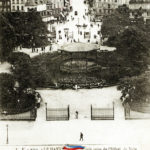
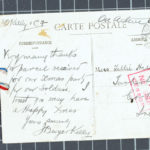


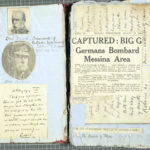


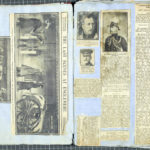

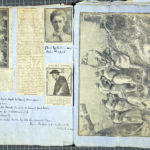
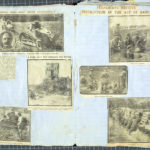


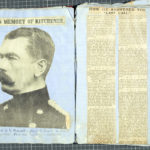




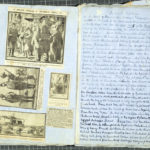


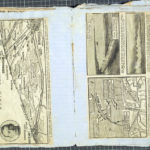

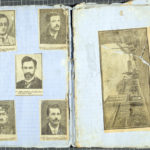

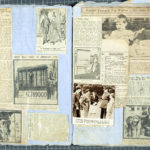
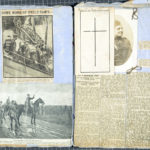

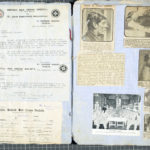
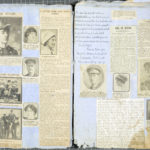








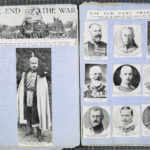
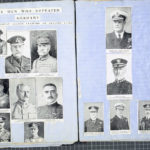
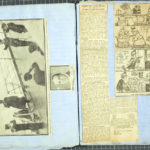




Login to leave a note